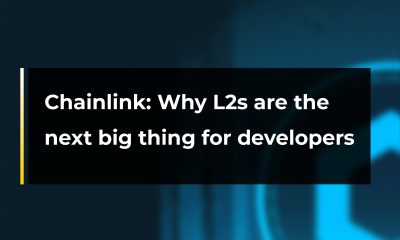FEATURED
Chainlink co-founder speaks on how blockchain can solve misinformation

Misinformation has become a concern in the fast-evolving digital space. It’s seemingly a problem that society has almost become complacent about, accepting it as an inevitable part of the information landscape. At SmartCon 2023, Steve Ellis, co-founder of Chainlink, shared his thoughts on how blockchain technology can help create a more accountable world through the concept of a verifiable web.
Steve acknowledged that misinformation is a huge problem in the world, stating how strange it is that “fake news has become old news, and culturally, we’re just used to it.” People now turn to AI bots like ChatGPT for medical advice, even though these bots may provide inaccurate information, he said.
To address this issue, Steve emphasized the role of blockchain technology, particularly Chainlink, in fostering accountability and verifiability in the digital social world. He highlighted how blockchains add a layer of accountability to any piece of technology, complementing the internet’s capability to share vast amounts of information.
The co-founder said that while the internet excels at making information and data available, it often struggles to verify the accuracy of that information. Blockchain, on the other hand, excels at verifying and validating data.
Verifiability and Enforceability
Verifiability and enforceability are the two key facets of accountability within blockchain blockchains. Steve explained that verifiability involves tracing and understanding the source and history of data, making it publicly accessible. Enforceability employs smart contracts to ensure that only authorized actions are taken by the right individuals.
A combination of both allows developers to tailor blockchain applications to meet their specific needs, whether they prioritize transparency or privacy.
Furthermore, open-source initiatives can promote accountability and are important for making technology transparent and visible to the public. However, Steve Ellis pointed out that verification is the real challenge. While people publish content and code regularly, getting others to verify and validate it remains difficult. This is where blockchain technology comes into play, introducing an incentive layer that encourages individuals to validate information and ensure its accuracy.
Conclusively, while there is still much work to be done to increase blockchain adoption, the integration of blockchain into various applications will help build a much more verifiable accountable world, the co-founder said.
Read also;
Proshares introduces new Ether short ETF
What do you think of this article? Share comments below.














